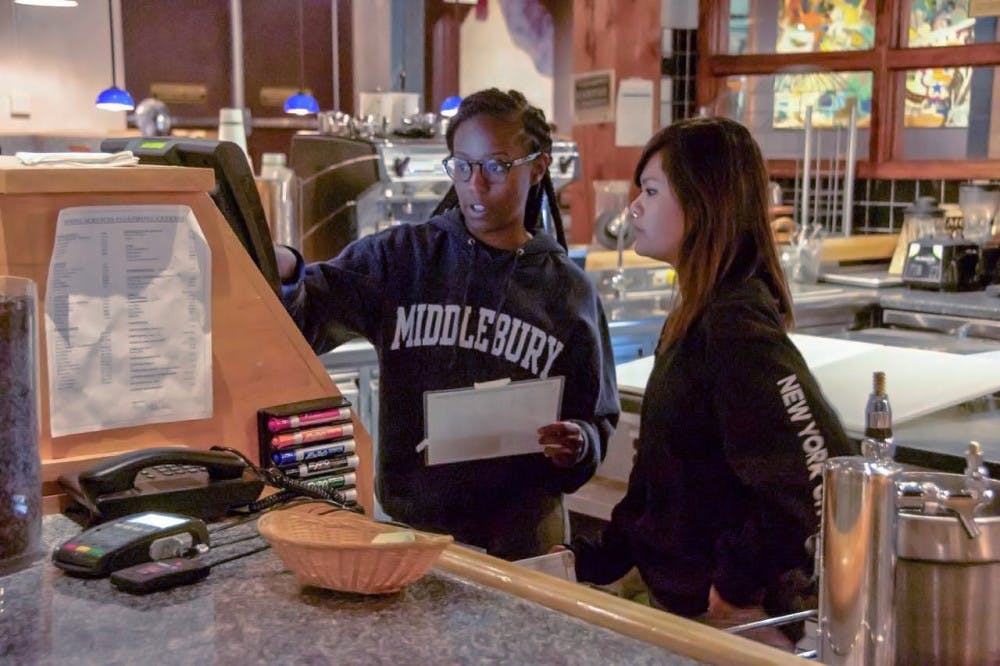A Talenti gelato tub-turned-coin jar and a Chicago flag lamp sit on the desk of Student Government Association President Nia Robinson ’19, two items not unlike their owner, straddling the line between two identities.
Robinson remembers watching The Rosa Parks Story as a child with her grandmother while eating saltines and drinking Lipton tea. She also recalls the way that her cousins would make fun of her for “being so dark, but talking so white.”
Moving to school in the suburbs in fourth grade, Robinson began to grapple with the concept of race. She would receive questions about her white stepfather when he arrived to pick her up after school or why her speech did not match her skin tone. “You’re just trying to be white,” Robinson recalls the accusations, “Why don’t you talk like how you are supposed to?”
This sense of in-betweenness was the focal point of Robinson’s TEDxMiddlebury Talk in the fall of 2017, where she discussed the feelings of otherness that have lingered since her childhood.
“Most of my life has been spent in predominantly white schools. Half of my family is white and eventually everywhere I went, I was the other,” she said. “Even when I was surrounded by black people, I was the other.”
In that same speech, Robinson described that same sense of otherness at Middlebury. She remembered her unease at the pauses and stares she and her family received when they entered Mr. Ups restaurant, and the stream of questions from parents about “her experiences.” Despite being a student for two and a half years, looming reminders such as the portraits of past presidents seemed to remind her that she did not belong.
Yet in her confident words to the audience on the TEDx stage, Robinson concluded that “we are not as lost as we think we are.” In fact, Robinson later recalls that the conference itself was a turning point in the trajectory of her Middlebury career.
“I will be clear and also candid, I had a really rough time my first two years here.” said Robinson. “I think it was through TEDx that I worked through a lot of my issues here.”
Most importantly, she walked away with a visceral understanding of both the amazing capacity of empathy to mend and of vulnerability as a medium for understanding.
“You need to be the person that you needed when you were younger, and I think about that all the time,” she said. “I kind of need to be the person that I needed for my first and second year for other first years.”
This deep empathy is what colors all of Robinson’s actions and what she strives for in her leadership. As a former member of the college’s Community Judicial Board and a former co-president of the Black Student Union, Robinson has incorporated this sense of deep understanding for others to be a key liaison between the community, faculty, administrators and students.
It is this experience that prepared Robinson to build her platform in the 2017 SGA Presidential race. She won 66 percent of the vote, with 687 more votes than the runner-up.
“She listens. She speaks hard truths in a way that people can hear. She stays connected,” said President Laurie Patton. “When I first met Nia in 2016, we began by talking about poetry. Then we talked about the Black Students’ Union. Then the overall student experience at Middlebury. Then the pursuit of sociology. At ease with each one of these topics, Nia showed that she was wise — empathetic and critical at one and the same time.”
Charlotte Tate, associate director of the Rohatyn Center for Global Affairs, spoke to Robinson’s incredible talent for connecting with almost any individual. After coincidentally running into Tate and her masters swim team, Robinson immediately forged a friendship with the entire group of middle-age swimmers. She continues to join the group for their 7:30 a.m. post-workout gathering - regardless of her busy academic and work schedule.
Robinson’s ability to connect deeply with others extends well beyond Old Chapel and the faculty. Clark Lewis ’19, a fellow Posse scholar and close friend, recalled their final interview for the Posse scholarship. In an atmosphere of intense competition, finalists boasted about their academic achievements and brandished their extracurricular activities.
“Then, there was Nia,” Lewis said. “While the rest of us were trying our best to answer the judges’ questions, Nia instead got up in front of the group and sang a song. It was ‘Three Little Birds’ by Corinne Bailey.” Everyone in the room was stunned silent, Lewis said.
Since stepping foot on campus, Robinson has seen vulnerability as a power rather than a flaw, using her deep understanding of others to connect with people regardless of their labels and tags. Robinson has used her experiences of being lost to help others be found. When asked whether she believes in the power of vulnerability, her eyes welled up before she nodded and broke into one of her classic smiles.
A Dynamic Leader Ready for Change: An Intimate Look at SGA President Nia Robinson

Comments



